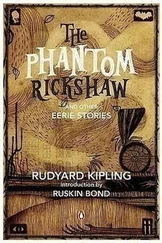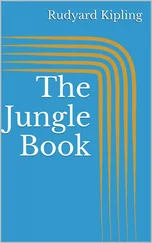The Adjutant had done his very best to describe his feelings after swallowing a seven–pound lump of Wenham Lake ice, off an American ice–ship, in the days before Calcutta made her ice by machinery; but as he did not know what ice was, and as the Mugger and the Jackal knew rather less, the tale missed fire.
"Anything," said the Mugger, shutting his left eye again—" anything is possible that comes out of a boat thrice the size of Mugger–Ghaut. My village is not a small one."
There was a whistle overhead on the bridge, and the Delhi Mail slid across, all the carriages gleaming with light, and the shadows faithfully following along the river. It clanked away into the dark again; but the Mugger and the Jackal were so well used to it that they never turned their heads.
"Is that anything less wonderful than a boat thrice the size of Mugger–Ghaut?" said the bird, looking up.
"I saw that built, child. Stone by stone I saw the bridge–piers rise, and when the men fell off (they were wondrous sure–footed for the most part—but when they fell) I was ready. After the first pier was made they never thought to look down the stream for the body to burn. There, again, I saved much trouble. There was nothing strange in the building of the bridge," said the Mugger.
"But that which goes across, pulling the roofed carts! That is strange," the Adjutant repeated.
"It is, past any doubt, a new breed of bullock. Some day it will not be able to keep its foothold up yonder, and will fall as the men did. The old Mugger will then be ready."
The Jackal looked at the Adjutant, and the Adjutant looked at the Jackal. If there was one thing they were more certain of than another, it was that the engine was everything in the wide world except a bullock. The Jackal had watched it time and again from the aloe–hedges by the side of the line, and the Adjutant had seen engines since the first locomotive ran in India. But the Mugger had only looked up at the thing from below, where the brass dome seemed rather like a bullock's hump.
"M—yes, a new kind of bullock," the Mugger repeated ponderously, to make himself quite sure in his own mind; and "Certainly it is a bullock," said the Jackal.
"And again it might be—" began the Mugger pettishly.
"Certainly—most certainly," said the Jackal, without waiting for the other to finish.
"What?" said the Mugger angrily, for he could feel that the others knew more than he did. "What might it be? I never finished my words. You said it was a bullock."
"It is anything the Protector of the Poor pleases. I am his servant—not the servant of the thing that crosses the river."
"Whatever it is, it is white–face work," said the Adjutant; "and for my own part, I would not lie out upon a place so near to it as this bar."
"You do not know the English as I do," said the Mugger. "There was a white–face here when the bridge was built, and he would take a boat in the evenings and shuffle with his feet on the bottom–boards, and whisper: 'Is he here? Is he there? Bring me my gun.' I could hear him before I could see him—each sound that he made—creaking and puffing and rattling his gun, up and down the river. As surely as I had picked up one of his workmen, and thus saved great expense in wood for the burning, so surely would he come down to the Ghaut, and shout in a loud voice that he would hunt me, and rid the river of me—the Mugger of Mugger–Ghaut! Me! Children, I have swum under the bottom of his boat for hour after hour, and heard him fire his gun at logs; and when I was well sure he was wearied, I have risen by his side and snapped my jaws in his face. When the bridge was finished he went away. All the English hunt in that fashion, except when they are hunted."
"Who hunts the white–faces?" yapped the Jackal excitedly.
"No one now, but I have hunted them in my time."
"I remember a little of that Hunting. I was young then," said the Adjutant, clattering his beak significantly.
"I was well established here. My village was being builded for the third time, as I remember, when my cousin, the Gavial, brought me word of rich waters above Benares. At first I would not go, for my cousin, who is a fish–eater, does not always know the good from the bad; but I heard my people talking in the evenings, and what they said made me certain."
"And what did they say?" the Jackal asked.
"They said enough to make me, the Mugger of Mugger–Ghaut, leave water and take to my feet. I went by night, using the littlest streams as they served me; but it was the beginning of the hot weather and all streams were low. I crossed dusty roads; I went through tall grass; I climbed hills in the moonlight. Even rocks did I climb, children—consider this well. I crossed the tail of Sirhind, the waterless, before I could find the set of the little rivers that flow Gungaward. I was a month's journey from my own people and the river that I knew. That was very marvelous!"
"What food on the way?" said the Jackal, who kept his soul in his little stomach, and was not a bit impressed by the Mugger's land travels.
"That which I could find— cousin ," said the Mugger slowly, dragging each word.
Now you do not call a man a cousin in India unless you think you can establish some kind of blood–relationship, and as it is only in old fairy–tales that the Mugger ever marries a jackal, the Jackal knew for what reason he had been suddenly lifted into the Mugger's family circle. If they had been alone he would not have cared, but the Adjutant's eyes twinkled with mirth at the ugly jest.
"Assuredly, Father, I might have known," said the Jackal. A Mugger does not care to be called a father of jackals, and the Mugger of Mugger–Ghaut said as much—and a great deal more which there is no use in repeating here.
"The Protector of the Poor has claimed kinship. How can I remember the precise degree? Moreover, we eat the same food. He has said it," was the Jackal's reply.
That made matters rather worse, for what the Jackal hinted at was that the Mugger must have eaten his food on that land march fresh and fresh every day, instead of keeping it by him till it was in a fit and proper condition, as every self–respecting mugger and most wild beasts do when they can. Indeed, one of the worst terms of contempt along the River–bed is "eater of fresh meat." It is nearly as bad as calling a man a cannibal.
"That food was eaten thirty seasons ago," said the Adjutant quietly. "If we talk for thirty seasons more it will never come back. Tell us, now, what happened when the good waters were reached after thy most wonderful land journey. If we listened to the howling of every jackal the business of the town would stop, as the saying is."
The Mugger must have been grateful for the interruption, because he went on, with a rush:
"By the Right and Left of Gunga! when I came there never did I see such waters!"
"Were they better, then, than the big flood of last season?" said the Jackal.
"Better! That flood was no more than comes every five years—a handful of drowned strangers, some chickens, and a dead bullock in muddy water with cross–currents. But the season I think of, the river was low, smooth, and even, and, as the Gavial had warned me, the dead English came down, touching each other. I got my girth in that season—my girth and my depth. From Agra, by Etawah and the broad waters by Allahabad—"
"Oh, the eddy that set under the walls of the fort at Allahabad!" said the Adjutant. "They came in there like widgeon to the reeds, and round and round they swung—thus!"
He went off into his horrible dance again, while the Jackal looked on enviously. He naturally could not remember the terrible year of the Mutiny they were talking about. The Mugger continued:
Читать дальше












